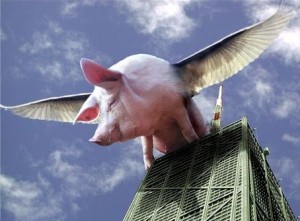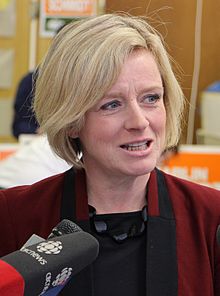Canola model costs more, delivers less
(November 25, 2015) Last week I was heading to town and saw my neighbour’s two combines and a truck out in the field straight combining some standing canola. This is a relatively new practice and doing so next to the eastern slopes of the Rocky Mountains near the end of November certainly says something about climate change and so-called technological progress. In this case it is claimed newer varieties of canola with thicker pods have made straight combining feasible but the seed to plant such a crop comes from a giant agro-chemical-seed company and is very expensive.
It is farmers who pay the real cost of this high input model and provide astronomical profits to the agro-chemical-seed companies. Known as the “canola model” and promoted by these giant companies, it entailed the privatization of the canola genome once paid for by farmers. Now canola not only costs more for variety development and delivers poorer results, but imposes those substantially higher costs on farmers, as any farmer growing canola can testify.
My neighbour out harvesting in November trying to salvage a canola crop which cost a fortune to plant and now having to worry about his canola crop becoming worthless as it goes rancid in the bins is paying that price.
In spite of evidence to the contrary, there are still some farmers who think following the canola model in wheat and barley would be a good thing. We know consumers have no desire to eat genetically modified food and most farmers understand that giving up their ownership of grain genetics to the giant agro-chemical-seed companies just means higher costs for them.
It will therefore be interesting to see if farmers use their mail-in ballots in the Saskatchewan Wheat, Pulse, and Barley Commission elections due at the end of this week to support candidates with their interests at heart or will they vote for those supporting the canola model.
More FUD about western grain
 (November 23, 2015) I suppose it had to happen sooner or later. From the Bizzaro world of the Frontier Center, where black is white and up is down, comes the absurd claim that Canada’s grain grading system is the laughing stock of the world. This claim, apparently designed to sow fear, uncertainty, and doubt (FUD) was recently published in the National/Financial Post, one of Canada’s largest privately subsidized newspapers. It comes from another largely anonymous group claiming to represent farmers calling itself the “North American Grain Grading Group.”
(November 23, 2015) I suppose it had to happen sooner or later. From the Bizzaro world of the Frontier Center, where black is white and up is down, comes the absurd claim that Canada’s grain grading system is the laughing stock of the world. This claim, apparently designed to sow fear, uncertainty, and doubt (FUD) was recently published in the National/Financial Post, one of Canada’s largest privately subsidized newspapers. It comes from another largely anonymous group claiming to represent farmers calling itself the “North American Grain Grading Group.”
Now the fact is Canada has long been uniquely successful in the world grain trade by staking out its niche as the producer of the highest quality milling wheats, durum wheats, and human consumption barley in the world. However, it was not long after the Harper government killed the Canadian Wheat Board that our former customers, like China and Japan, started to publically complain that the reliable delivery of high quality grain was no longer happening.
Instead of apologizing to western farmers for cheer-leading the greatest grain robbery in Canadian history, the commentators and Astroturf groups that pushed to kill the CWB are now pushing to kill our high quality oriented grain grading system. That would be the system which our customers are complaining is no longer being enforced now that the CWB is gone.
This in spite of the fact the Frontier Center commentary acknowledges that the system they helped to create with the killing the CWB allows “global grain buyers to snap up downgraded Canadian grain and turn around and sell it – at a much higher price – to millers around the world.” By blaming our grading system they may hope to spread doubt this is really the private trade using its new market power to cheat farmers of the full value of their high quality wheat.
Once again we have short-sighted FUD being sown about one of our strengths, in this case the Canadian Grain Commission and our high quality oriented grain grading system.
This is foolish enough, but when you consider that this Canadian quality assurance system evolved to overcome our comparative disadvantages of climate, distance to deep water ports, and long ocean freight distances, the argument to dismantle it seems self-destructive at best.
Here in Alberta the adults are at last in charge and Canadians recently voted to throw the wreckers and book-burners out of Ottawa. Here’s hoping that the new administration in Ottawa has the intellectual heft to see this call by the Frontier Center and its friends for what it is: just a small group (I’m betting they have fewer than the 130 members admitted to by the Western Barley Growers Association in court documents) making the case for a private grain trade that no longer has any credibility with either farmers or our international customers.
Congratulations Canada
(Oct. 19/15) In his victory speech the new Prime Minister elect, Justin Trudeau, said the election results showed that Canadians can “have faith in your country.”
And indeed congratulations to Canadians are very much in order. After the dour and almost paranoid reign of the Harper Conservatives many of us were starting to wonder about how widely the Canadian values we believed in were shared by our neighbours.
Tonight’s election showed that even in Saskatchewan and Alberta where vote splitting allowed Conservative victories, the vast majority of Canadians still held to the decent ideals that have characterized Canada for decades.
The major achievement of Prime Minister Harper and his cadre of fundamentalists has been to frighten Canadians enough that they stampeded to the alternative they thought best able to defeat the fundamentalists of the Conservative Party.
Harper will be remembered for his administration’s very long list of destructive and negative actions. But this destruction and fear-mongering have served to remind Canadians that the vast majority of us stand for a positive, tolerant, and inclusive society.
Canadians deserve a thank you for voting for change. With a new government in power Western farmers who understand the economic value of orderly marketing are looking forward to working toward the restoration of our single-desk grain marketing system so thoughtlessly destroyed by the Conservative administration.
The restoration of our single-desk will be good for our communities and good for Canada.
TPP will benefit canola and beef?
– Oh please! (When pigs fly)
(Oct. 16/15) Some claim beef and canola will benefit from the Trans Pacific Partnership (TPP). As the kids would say with an eye-roll: “Oh please.” A little reality check is in order. First off, the Canadian Wheat Board (CWB) never had any problem selling into Asian markets. Why? Simply because the CWB and the Canadian Grain Commission guaranteed a quality-assured, premium quality product delivered honestly and reliably.
The Asian market is very concerned with quality, purity, and honesty. With canola there is not only the problem it is largely sold and delivered by the big international grain companies who have blotted their copy books on those criteria over the years, but also the fact our canola is genetically modified which is a big marketing problem.
Our cattle have a reputation for being given growth hormones and antibiotics that most of the world does not want to eat. Then there is that little problem of mad-cow disease which polite commentators over here ignore, but the higher quality markets do not.
Setting all that aside, there are the huge distances our products have to travel just to get to deep water. Asia is considerably closer to our competitors who process agricultural products and our farmer-competitors are usually only dozens of miles from deep water while in Canada we are literally hundreds of miles to port through several mountain ranges.
By killing the CWB and privatizing the Canadian Grain Commission Harper has already bungled keeping our wheat, barley, and durum selling for a premium into this market. The fact prairie farm gate prices are half of what they were just three years ago when we had a Wheat Board speaks volumes as do public complaints from both Japan and China about quality and reliability.
You can have all the trade agreements you want but if the quality of the product or its reputation is not there it is an empty exercise. The TPP will not force a single Asian food customer to buy products that do not meet their standards.
Our agricultural problems are largely the creation of the Harper government wrecking our quality-assurance and farmer-owned and controlled marketing systems. A new Federal government will have the task of restoring what the Harper Conservatives have destroyed.
Speaking of self-inflicted wounds and the TPP deal, what makes dairy farmers think they will get the $4.3 billion dollars Harper has promised to compensate them for the lost value of their quotas when the same PM Harper has refused to compensate western farmers for killing the Wheat Board and fought them tooth and nail through the courts?
Note: – You can read a detailed analysis of TPP and food sovereignty here.
Con Ag Minister blowing fumes
(Oct. 15/15) The Manitoba Cooperator is carrying a story (Grain backlog no impact on farm incomes: Ritz) quoting Agriculture Minister Gerry Ritz ridiculing the latest independent academic study showing farmers would have been billions of dollars better off if they still had the single-desk Canadian Wheat Board.
Astoundingly, Ritz claims farmers never lost money. Wasn’t it just last year that he was touting his “Fairy Dust for Grain Farmers Act” which he then claimed would fix the problem of, wait for it, lost farm income?
Ritz now claims if farmers had really lost money, there would have been Ag-Stability payouts. That would be the program which he changed so farmers would have less chance of getting a payout.
Not to get too inside baseball, but those payouts would be triggered in a falling market, and as Professor Gray observed
“Yes, (western) farmers had a good year, but that doesn’t take away from the fact they could’ve been several billion dollars better off.”
Gray went on to say: “It’s unfortunate the minister isn’t better briefed.”
Indeed it is. This is a Minister who will do anything and say anything rather than deal with the facts. He has shown complete disrespect to independent farm groups and academics not on his government funded gravy train, who point out his beliefs and ideology do not work in reality. 
His bungling of food safety issues, the customer complaints rolling in from around the world, the critical academic studies, and grain cheques that are half what they should be speak for themselves. Hopefully the Minister will soon lose his bully pulpit and can move on to other things while the grownups try to pick up the pieces of the mess he has created.
Burning Bridges to the Future
Ottawa book-burners hit Lethbridge Research Station
(August 25/15) The now systematic burning of scientific libraries by Ottawa over the past three years can no longer be seen as just near-sighted policy. It has to be recognized for what it is: the active sabotage of our publically financed research and development capacity by people who do not value or understand knowledge in the public interest.
Friday’s announcement that the library at the Lethbridge Agricultural Research Station had been trashed was especially tragic and the excuse proffered by a Conservative stooge that requests for library materials had declined is especially obnoxious given the wholesale firing of scientific personal over the past ten years by Ottawa. The dumpsters outside the library filled with scientific monographs, books, and other publications also give the lie to the contention that the materials have been copied onto computers for future use.
Science is built in increments based on previous studies. Those studies, described as “gray matter” by research librarians because the studies are usually monographs bound in gray covers, and no matter how old, often contain nuggets of information critical to current problems.
Scientific researchers, the people who actually “get dirty with their data,” have to spend years learning about their subject by going into those libraries and actually reading the papers left for future generations by their predecessors. Those dusty papers are not usually available either as digital versions or in textbooks but they almost always contain critical background which allows people today to understand the context of their work.
Consider some short examples: In 1927 a researcher published a paper observing that wild bees were especially prevalent in alfalfa crops that produced heavy seed yields. Contemporary researchers concerned with declining bee populations may have been interested in this research and the subsequent papers that grew from it. Unfortunately these gray matter papers, referenced in an obscure 1963 report from the Entomological Society of Alberta, have almost certainly been trashed by Ottawa.
In 1929 a solid stem wheat was tested for saw fly resistance resulting in the first saw fly resistant wheat “Rescue” being licensed in 1946. This new wheat saved Canadian farmers from having to buy the newest expensive wonder chemical DDT.
Today, farmers still grow midge resistant wheat based on this early work. This insect resistant wheat can be seen as a fine example of science in the public interest that was free of the conflicts-of-interest built into private funding of agricultural research. Would one of the giant foreign-owned agro-chemical-seed companies actually develop a wheat strain which did not need the application of one of their very profitable insecticides?
Students of history know that nothing happens without a context. The same applies to political movements. There is a strain in Conservativism which recognizes the importance of preserving (conserving!) the work of previous generations. However there is also a strain in that political philosophy which has a tradition of burning books which goes back to the Middle Ages. It is now painfully obvious to all but the gullible or dishonest that the book burners are now in control in Ottawa and they have just reached out again to trash another western Canadian asset.
For Further Reading:
Vanishing Canada: Why we’re all losers in Ottawa’s war on data
Trashing Cereal Research Center puts GM wheat on the table
Dismantling of Canada’s Science Libraries
Health Canada Library dismantled
Secret Memo Casts Doubt on Feds’ Claims for Science Library Closures
Public Science – what practicing scientists have to say about cuts
Canadian Wheat Board library and archives destroyed
Commentary:
Western Grain a SNAFU in more ways than one
 (July 29/15) The Agricultural Producers Association of Saskatchewan (APAS) along with Saskatchewan Wheat Development Commission and Saskatchewan Barley Development Commission hosted the “Farmers Forum on Grain Transportation, Getting on Track: Solutions for the future” in Regina on July 20, 2015. From the perspective of grain farmers, the results could be characterized with the old military term SNAFU (Situation Normal, All Fouled Up). For the grain companies it is more like: “Situation Nice, All Finances Up.”
(July 29/15) The Agricultural Producers Association of Saskatchewan (APAS) along with Saskatchewan Wheat Development Commission and Saskatchewan Barley Development Commission hosted the “Farmers Forum on Grain Transportation, Getting on Track: Solutions for the future” in Regina on July 20, 2015. From the perspective of grain farmers, the results could be characterized with the old military term SNAFU (Situation Normal, All Fouled Up). For the grain companies it is more like: “Situation Nice, All Finances Up.”
From the academic and impartial presenters at the APAS conference, the message was essentially the same: “more grain than ever is moving to port but farmers are not seeing either higher prices or fair delivery opportunities” and “farmers have no market power and are getting fleeced by the private trade.” No surprises there. The numbers have changed but not the structure.
What has changed is the spin put on this. Now instead of farmers having no market power, they are characterized using the softer and more traditional “price takers.” And the grain companies, instead of taking “excess profits” are now characterized as “rationing access to the system” by increasing the basis levels they charge farmers to get their grain into the system. In other words, how desperate the farmer is to sell determines how badly he is fleeced by the grain companies.
But hey, it is not really the devil making the grain companies do this. The grain company apologists say it is the railways! And the grain companies complain the railways sometimes don’t deliver a handful of cars on time. Never mind that the numbers show the railways are delivering more grain than ever to port.
Faced with this fact the argument then shifts to claiming that is not really the railways’ fault either because our system does not have enough capacity now. How do we know this? The market, it is claimed, is telling us. This fairy story goes that the grain companies are being forced by the invisible hand of the market to charge farmers excessive basis, aka “profits,” to get them to stop calling the elevators wanting to deliver grain for sale so the elevator companies can re-sell it and make excess profits. The logic here seems to be that if we take the telephone away from farmers, then they will not hassle the elevator companies and force them to charge farmers excess basis.
If that strikes you as a bit of self-serving circular logic, it is and don’t blame me, I’m just the reporter. You can read the original documents here.
The Frontier Center for Public Policy predictably blamed government regulations. Their revelation appears to be that the grain companies are charging excess basis because the railways are over-regulated. Presumably if the railways could take their share of excess profits from those price-taking farmers all would be well.
Farmers who are captive to both the railways and grain companies might not be happy, but two out of three components in the grain system certainly would be. More pathetic by far was the grasping for “market solutions” to this mess that did not involve anything that would actually regulate how the players in the grain market behave.
How that market actually behaves was very well explained by the eminently clear spoken Montana-based consultant Terry Whiteside. He explained that when the US deregulated its railways in the 1980s there were 40 major railways. Now there are a mere 4 left and they have divided up the country “into their own regional monopolies.” So he essentially said their US Surface Transportation Board would have to impose more regulation to make their system work so it did not suck the life out of their agricultural producers – producers who still enjoy generous US government production subsidies by the way.
Given the US experience, not to mention the mess western Canadian farmers are now facing, it makes all the so-called market solutions in transportation seem less than timely or useful.
Of course nobody at the conference even alluded to the one market solution that actually made our transportation and handling system work efficiently and fairly for everyone including farmers and small processors: the recently deceased single-desk Canadian Wheat Board. Instead the grain companies are calling on the railways to buy more locomotives and grain cars, the railways are calling on the grain companies to get their act together and build more capacity, and both of them seem to expect farmers to pay for it all.
Perhaps Grain Summit 2016 or whatever it is called will finally come to the conclusion there are in fact zero market solutions to western Canada’s landlocked status that do not involve either draconian government regulation or a single-desk Canadian Wheat Board.
Perhaps Ottawa may even come to acknowledge that the single-desk Wheat Board which evolved after much trial, error, and misery on the prairies was in fact the only viable market-based solution available. But as many of us know, evolution can really be offensive to those who still believe in “invisible hands moving in mysterious ways.”
Since farmers are the ones who pay for all this nonsense, perhaps it is also time for gatherings like these to focus on restoring the institutions which actually worked that Ottawa has so recently destroyed rather than outlining the SNAFU we all are now living with. Then we would truly be getting “on track.”
Cool win a loss for Canadians
(July 20/15) This year’s spring seeding was largely uneventful thanks to very favorable weather which now appears to be sliding into a less favourable drought in parts of the prairies. However the headlines have not stopped nor has the damage from our ham-handed but ideologically pure friends in Ottawa.
A pedigreed seed grower tells me that last year’s decision by Agriculture Minister Ritz to kill the Canadian Food Inspection Agency’s inspections of pedigree seeded land and give the job to private companies has added an additional 25% to inspection costs on his operation. We both wondered how soon those private inspectors will become agents of one of the giant agro-chemical-seed companies now that impartial government inspectors are gone.
Speaking of giant agro-chemical-seed companies, Syngenta and Monsanto were reported in merger/takeover talks offering further evidence that competition and the pursuit of shareholder profits may not always lead to more competition and choice.
Of course the great comedy of the spring has been the ongoing COOL (Country Of Origin Labelling) saga between Ottawa and the US over the idea US citizens have a right to know where their meat comes from. Minister Ritz has promised hell-fire and brimstone will rain down on Yankee wine and other exports to Canada if COOL is not repealed.
Now an objective observer might wonder why Canadian cattle growers and Minister Ritz are so opposed to COOL. Don’t we have the cleanest cattle herd on the planet and isn’t it arguably raised in the cleanest environment on the planet?
Why wouldn’t they want to capitalize on that? After all, the Canadian Wheat Board had a long tradition of successfully using Canada’s wholesome reputation to sell grain. The single-desk CWB allowed western Canadian wheat and barley farmers to retain the beneficial ownership of their grain from their farms right to the end use customer. This meant the extra costs of providing quality-assurance to those premium customers were more than off-set by increased sales and premium prices which were returned directly to western Canada’s grain farmers by their single-desk wheat board.
Cattle, however, are different. Almost all Canadian cattle are processed by just two packing plants in Alberta that have somewhere north of 90% of Canada’s beef packing capacity. Like grain farmers without the single-desk CWB, cattle farmers surrender ownership of their crop to the big processors when they leave the farm. For these processors the benefits of promoting Canadian beef as a premium product apparently do not outweigh the segregation costs that would come with COOL. So Canadian beef producers are unlikely to see their beef treated as the premium product it most certainly is. Nor are they likely to see price premiums like Canadian grain farmers got when their single-desk CWB capitalized on our high quality-assured wheat and barley.
It will be interesting to watch the tug of war between big business and consumer interests in the US over COOL in the coming months. Given the US Congress has just backed industry by blocking labeling of food containing genetically modified ingredients, the outcome on COOL seems obvious. Whatever happens, look for Minister Ritz to claim he is defending western farmers while handing over control of our food to big business.
While we are on the subject of cattle, Minister Ritz spent much of the winter reassuring dairy farmers that supply management will be defended in the Trans Pacific Partnership (TPP) talks now nearly completed – at least until this Friday when he started to alter his position with the usual weasel words all too familiar to those who follow politics. The TPP is another treaty designed to make the world safe for giant corporations to access cheap raw materials from Canada – this time for the Pacific Rim countries. Dairy farmers may need reminding that it was the same Minister Ritz who broke his promise to grain farmers that they would have a vote on killing the single-desk CWB.
Indebted dairy farmers, perhaps anticipating a fat federal government cheque to compensate them for the value of their dairy quota going to zero, may wish to remember that it is Minister Ritz’s government that has fought the Friends of the Canadian Wheat Board tooth and nail to prevent farmers from receiving compensation for the value destroyed with the end of the single-desk CWB.
On the topic of governments, who can forget that two giant foreign government owned entities — G3 group, partly owned by the Saudi Arabian government and COFCO owed by the Chinese government — have both announced plans to consolidate their places in the international grain market with nary a peep out of Ottawa about the implications for Canadian farmers and Canada’s food security. Apparently it is okay for foreign governments to take control of our grains production through government owned single-desk buying agencies, but western farmers are not even given a vote on keeping their own single-desk marketing/selling agency.
Adding insult to injury Ottawa has seen fit to give the remaining assets of the Canadian Wheat Board to the G3 group for a promise of future investment. Of course, as the National Farmers Union observed, this investment will do nothing to enhance farm gate prices.
Last but not least, the Friends of the Canadian Wheat Board have been allowed by the Federal Court to examine how Minister Ritz’s Wheat Board handled farmers’ money after his appointees took charge half way through the crop year.
It has definitely been an eventful spring with implications for farmers in the west well beyond dusty fields.
Alberta goes orange
– and reasserts its cooperative heritage
(May 6, 2015) Watching last night’s Alberta election results were at once surprising and inspiring – surprising because of the scale of the upset after 44 years of the same party in power.
Inspiring because the NDP victory under Rachel Notley builds on an Alberta tradition of cooperation and community development much deeper than the more recently discovered oil wealth of this province.
It was farmers in the poorest part of Alberta who first had their municipal government open hospitals and hire nurses and doctors to provide community medical services for their citizens.
The oldest retail cooperative in Alberta started west of Red Deer over 100 years ago. The City of Calgary was the home of the forerunner of the NDP, the aptly named Cooperative Commonwealth Federation. The Alberta Wheat Pool held its founding convention in Calgary. With the support of Alberta grain farmers the Famous Five fought for the rights of women to be recognized as persons.
Alberta farmers also built an extensive network of cooperatives to provide everything from creameries, electrical services, rural telephone service, grain handling, home and auto insurance, as well as marketing boards for most agricultural commodities. It was only with the oil boom of the late 1970s that these institutions came under attack and many were slowly undermined.
The cooperative tradition runs very deep in Alberta and Rachel Notley and her party hail from that rich tradition. Albertans have taken courage into their hands and voted to build on that tradition.
Time will tell if the rest of the prairies also re-discover their own heritage of cooperation. However, the outcome of the Alberta election shows that restoring the single-desk Canadian Wheat Board is no longer as distant or as difficult as it may have seemed yesterday.
Ritz gives away Canadian control of grain marketing Icon
(April 16, 2015) Less than five business days after the Supreme Court of Canada declined to hear the claims of western farmers that they had a property interest in the value of the single-desk Wheat Board, Federal Agriculture Minister Ritz announced the sale of its remaining assets to a combination of Bunge, one of the smaller of the big four international grain companies, and a Saudi Arabian company “formed for the purpose of investing in Canada’s agricultural grain industry” according to the news release accompanying Ritz’s announcement.
Now that Minister Ritz has moved ahead with transferring ownership from Canada to foreign interests it is useful to remember that it was just six months ago he rejected an offer from Saskatoon based Farmers of North America, a 10,000 farmer membership company supplying farm inputs saying there was no time to consider it. Now six months later we have this.
Most farmers also remember Minister Ritz’s infamous promise before the last Federal election that farmers would have a vote on ending the Wheat Board single-desk. That promise lasted until the Harper administration received its much coveted majority courtesy of the voters in the greater Toronto area.
In yesterday’s press conference the Minister even had the audacity to accuse one young farmer of making things up when he asked the Minister how he could ignore the independently conducted plebiscite of 40,000 prairie wheat and barley producers held in 2011 showing 62% of farmers supported keeping the single-desk CWB. You can see a promotional video for the plebiscite here and you can see the plebiscite results summarized here.
Farmers also remember and can still look at the last audited statement from the farmer-controlled single-desk CWB which showed its assets had no significant debts against them aside from two laker-type grain ships which would have been paid off in less than five years. So Minister Ritz’s excuses about being forced to put taxpayer money into the organization after he took it over ring a little hollow for this writer, especially when he is the first agriculture Minister in over 75 years who has refused to table a full audited statement for his crippled Wheat Board. This secrecy lends credibility to charges the CWB sale was effectively subsidized with taxpayer money.
Killing the single-desk CWB and transferring its remaining assets to the private sector amounts to “the most massive transfer of wealth and earning power from farmers to the international trade in Canadian history” according to quotes from a number of informed people.
“Earning power” is the key part of that quote because it was the single-desk which gave the CWB its collective bargaining power and was also the key to the complex web it administered to extract maximum value from international customers for western Canadian farmers while providing high end customers like Saudi Arabia and others with quality-assured product. As has been said before, the CWB without the single-desk is a much diminished and less valuable organization both to western farmers and their former customers.
However, the buyers of what is left of the old CWB may still find themselves suffering “buyers’ remorse” over the next few years. The first thing they will discover is the Friends of the Canadian Wheat Board still have a very active case attached to some of the remaining assets of the old Wheat Board.
Secondly, some of the buyers may be under the impression they are buying the old Wheat Board, the one with the international reputation for quality assurance, reliable delivery, a high-end customer base, and most importantly a very dedicated membership of the most astute grain farmers in Western Canada. This strong majority of prairie farmers consistently elected 8 out of 10 farmer-elected directors who pledged to keep the single-desk farmer-controlled Wheat Board. This is the same group whose votes Minister Ritz and his predecessor Minister Strahl did their best to sabotage and ignore.
The next thing the buyers may well discover is that the reputation and even the very ability to economically provide quality assurance which was one of the pillars of the farmer-run single-desk CWB effectively ended with the single-desk. To date the replacements offered by the private trade have not measured up. Farmers are not happy with low prices and former high end customers are on very public record complaining about our “crappy wheat.”
With the loss of democratic Canadian control of our grain marketing and crop genetics to giant foreign corporations both the Canadian public and Canadian farmers are left to ask how secure their food futures really are.









